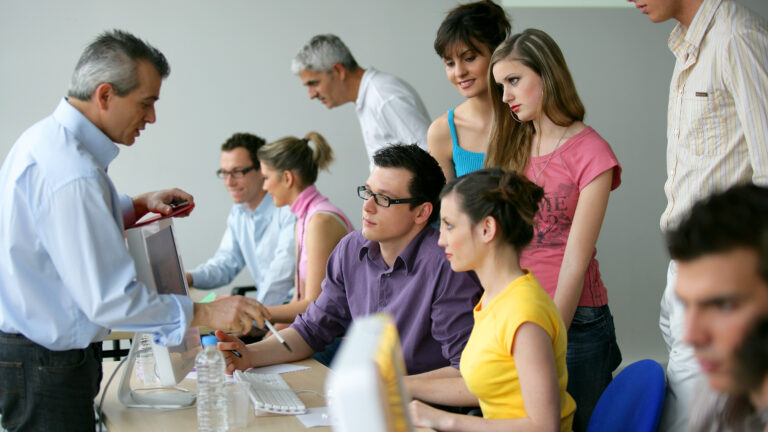
Enhancing Education Through Simulating Real-World Experiences
Here at Ardacious, we strongly believe in the power of experiential learning strategies to provide a more engaging, effective, and relevant education to learners of any level. Our approach goes beyond traditional methods, offering students the opportunity to engage in real-life activities and gain practical skills within a safe, simulated environment. This article explores the different types of experiential education, the benefits they bring, and how they align with Ardacious’ educational philosophy.
The Types of Experiential Education
Service-Learning
Service-learning focuses on community service while instilling important values and providing real-life experiences. Students engage in new environments, collaborating with experienced individuals in various fields. This approach allows students to apply theoretical concepts to tangible situations, while emphasising values like compassion, justice, and generosity.
Small Cohort Learning
Through cooperative education programs, students join small groups dedicated to specific areas of interest, such as medicine, law, business, or culinary arts. This immersive experience combines classroom learning with focused field trips and mentorship from seasoned professionals. Students gain practical knowledge and skills, enhancing their understanding of the subject matter.
Internships and Advanced Programs
Internships bridge the gap between academic settings and the professional world. Students have the opportunity to work in temporary positions, gaining firsthand experience and insights. Similarly, advanced programs during breaks offer valuable educational and career experiences.
Simulations
Simulation and role play is the simplest style of experiential learning to implement into a curriculum, and the most broadly applicable to learners of all ages. Simulative activities give students the opportunity to step into the shoes of a worker in a job that their education could lead to, giving them new insights that only hands-on experience can give. Ardacious in particular develops Augmented Reality training simulations, wherein a learner can visually spot issues that need addressing in a given scenario and implement solutions determined by the material they’ve studied. Scenario based role play also allows learners to experience the consequences of failure safely. This is a key part of transforming attitudes and behaviours around content, rather than just building theoretical understanding.
Benefits of Experiential Learning
Holistic Development
Experiential education promotes holistic growth, encompassing emotional, social, and academic aspects. Students learn to think critically, develop independence, and discover answers beyond provided materials. This comprehensive approach equips them with the necessary skills for their future endeavours.
Essential Life Skills
Experiential learning focuses on cultivating vital life skills that extend beyond textbook knowledge. Students develop effective communication, conflict resolution, networking, negotiation, active listening, diplomacy, creative thinking, and constructive criticism. By engaging in real-world scenarios, students refine these skills under the guidance of mentors and instructors.
Cooperation and Leadership
Experiential education emphasises teamwork and encourages students to seek support from their peers. It fosters cooperation, enables students to understand team dynamics, and promotes effective delegation based on individual strengths and weaknesses. Through collaborative projects, students learn the value of cooperation and develop leadership qualities.
Practical Experience and Experimentation
Early exposure to real-world experiences allows students to gain insights into various careers and explore their own interests. By actively participating in different roles and experimenting with problem-solving approaches, students develop a deeper understanding of their strengths, weaknesses, and preferences. This empowers them to make informed decisions about their future paths.
Safe Environment for Mistakes
Unlike traditional learning environments, experiential education embraces mistakes as valuable learning opportunities. Students are encouraged to take risks, knowing that they can recover, adapt, and improve. This creates a safe space for students to learn from their mistakes, fostering resilience and a growth mindset.
Reflection and Self-Awareness
Experiential learning places emphasis on reflection, enabling students to evaluate their actions, thoughts, and emotional responses. This process cultivates self-awareness, preparing students for the workforce, helping them make important life choices, improving personal relationships, and addressing emotional needs. Self-awareness is a lifelong skill that empowers individuals to navigate various situations effectively.
Increased Creativity
Experiential education encourages students to approach problems from different perspectives, fostering creativity and innovation. By being open to new ideas and diverse viewpoints, students develop critical thinking skills and find unique solutions to complex challenges. This creative mindset prepares them for success in various industries and personal endeavours.
Ardacious believes in the transformative power of experiential learning, providing students with real-world experiences, essential life skills, and a holistic education. By embracing this approach, students are better equipped to navigate the complexities of the future with confidence, purpose, and creativity. Contact Ardacious to learn more about our commitment to experiential education and how it can benefit your learner’s educational journey.
